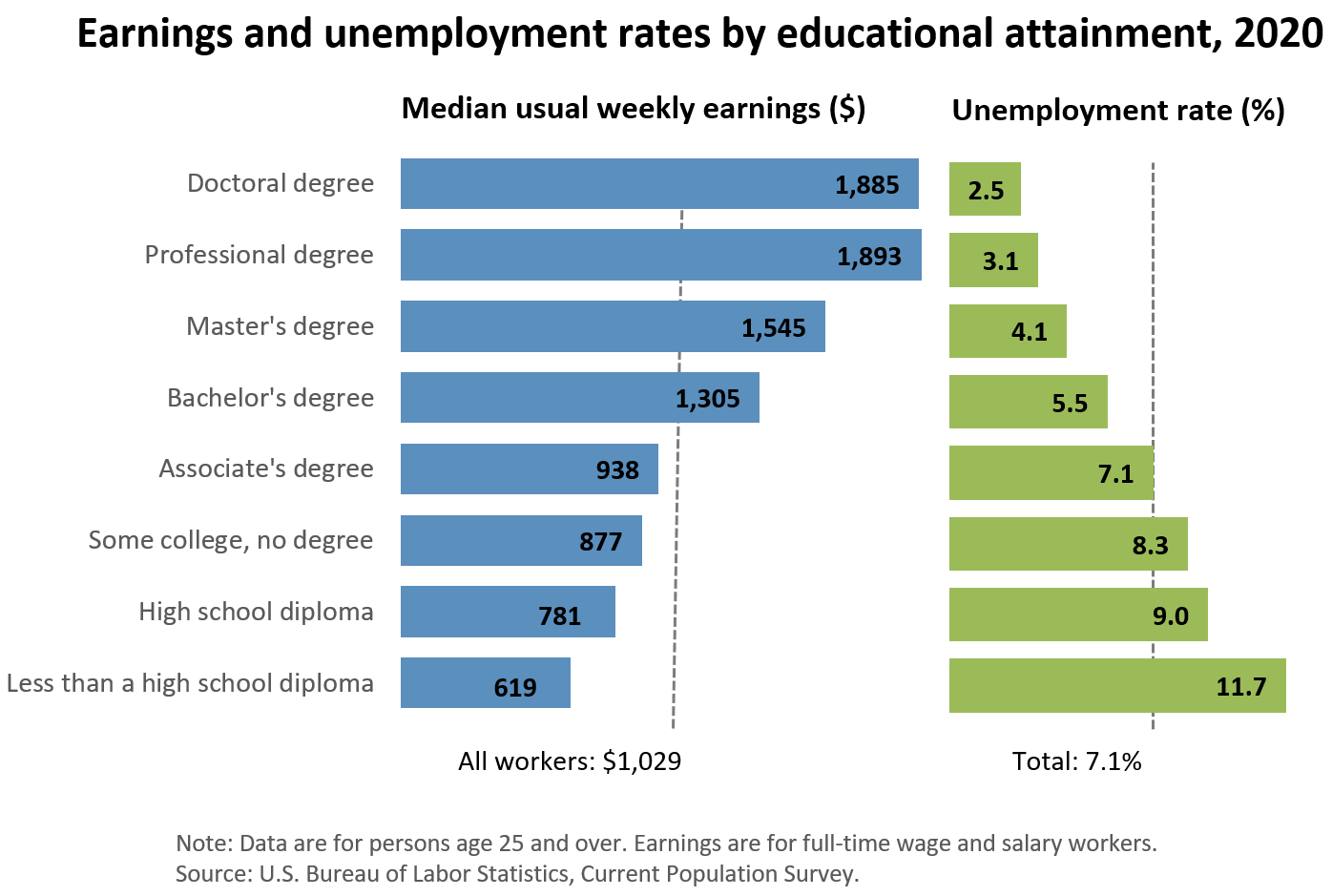The question most people ask about the job market is: Education or experience, which is more important to find a job? Do you really need to spend all that time and money getting your degree when you could be earning money, gaining experience, and working instead?
Can employers overlook the lack of credentials on a resume if the applicant has real-world experience and on-the-job training?
Job Market: What are Businesses Looking for?
Harvard Business School surveyed 600 business and human resource leaders to answer these questions. The employers held positions such as vice presidents and directors in a variety of industries. Their companies ranged in size from 50 to 10,000 employees.
According to the survey, 37% of employers ranked relevant work experience as the most important qualification, and 40% ranked a four-year degree as the least important.
When a job is hard to fill, employers are more likely to overlook the lack of a degree if candidates have sufficient work experience instead.
In the study, larger companies were found to be more open to candidates with less education than smaller companies. For companies with more than 10,000 employees, relevant work experience was more important than a college degree (44%) when considering job candidates.
“According to the survey, 37% of employers ranked relevant work experience as the most important qualification, and 40% ranked a four-year degree as the least important.”
-Harvard Business School-
Additionally, college costs are on the rise, and the average student loan debt in 2020 was about $37,500, so many people are beginning to wonder whether a bachelor’s degree is necessary.
Do Employers Require Bachelor Degrees?
The same Harvard Business School study found that between 2007 and 2010, postings requiring a bachelor’s degree increased by 10%.
Interestingly, the study found that nine out of ten job postings that requested a bachelor’s degree did not contain additional duties or responsibilities compared to other postings with the same title that did not require a bachelor’s degree.

Then why does a degree matter when the responsibilities and duties of the job remain the same regardless of the employee’s educational background?
According to the study, employers believe applicants with a college degree are more “job-ready” than those without. Particularly, employers believe that candidates with degrees possess more hard and soft skills than non-degreed candidates.
However, employers agree that having a college degree does not automatically ensure that a candidate will be a better employee than someone without one. Employers feel that productivity levels between non-degreed and degreed employees are similar, and retention rates between the two remain the same.
What Pays Better, Education or Experience?
According to our experience, every candidate should be evaluated on a case-by-case basis and anyone can develop their own skill-set and talent regardless of their education.
There are many General Managers in hotels who began as bartenders and rose to executive roles through their skills and passion. Those who make their way up to the general manager level are usually earning six-figure salaries.

Source: U.S. Bureau of Labor Statistics
A four-year undergraduate degree can be quite expensive. So many people’s question is: Is pursuing an undergraduate degree associated with higher salaries? data from the Bureau of Labor Statistics (BLS) shows that there are benefits to pursuing a degree.
People with a bachelor’s degree who were at least 25 years old in 2021 had a total unemployment rate of 5.5%, while those with only a high school diploma had a rate of 9.0%.
According to the data, median weekly earnings for those with bachelor’s degrees was $1,305, versus $781 for those with high school diplomas.
There is no guarantee that a degree will increase your income, but it is arguable that the degree may jumpstart your career and expedite career advancement.
You are also likely to be considered more prepared than individuals who do not have an education background in that field if you join an industry where you have been working toward a credential that has a high perceived value for employers.
Career-oriented Colleges are a Good Choice
Having both work experience and education would be the best scenario. Additionally, we can agree that not everyone can afford to earn a bachelor’s or master’s degree. In our experience working in the education industry for many years, technology has brought new (And less expensive) options to obtain a good education and gain work experience at the same time.
Career colleges would probably be the most practical and economical option. In contrast to a bachelor’s degree program at a university, hospitality programs at career colleges are more affordable and the program allows the student to experience a combination of both an academic and practical learning.
Colleges provide students with the tools and skills employers seek, so they can learn in class and apply what they learn on the job.
For example, a major private college in Vancouver, Canada (The Cornerstone International Community College), offers workshops for obtaining micro-credentials in hospitality management.
So to answer the question of whether education or experience is more important, it really depends.

© Cornerstone College. All Rights Reserved.
As a result of these workshops, students gain additional tools and certifications that other colleges do not provide, so they are more competitive than others and ready to take on the challenges of finding a new job in the highly competitive hospitality industry.
There are a variety of workshops designed for this purpose, which include a certificate to show employers:
◊ Food Safety workshop
◊ Serving it Right workshop
◊ First-aid workshop
In terms of education or experience, there is no perfect formula that guarantees success. But what does guarantee success is continuous learning and building skill sets. This is the golden rule to growing your career.
Let's Talk!
At Bliss, we specialize in helping students, institutions, and hotels succeed. Our goal is to build the leaders of tomorrow for the hospitality industry.


Recent Comments